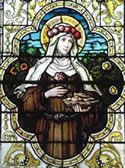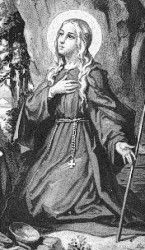"Prayer reveals to souls the vanity of earthly goods and pleasures. It fills them with light, strength and consolation; and gives them a foretaste of the calm bliss of our heavenly home."
Today, September 4, we celebrate the feast day of Saint Rose of Viterbo (Rosa, 1234-2352), miracle worker, Franciscan tertiary, and Virgin of the Church. Saint Rose lived a brief 18 years, but during that time accomplished amazing works through her love of the Lord and devotion to Our Blessed Mother.
Saint Rose was born of poor and pious parents, in Viterbo, Italy. She entered the world at a time when Emperor Frederick II was oppressing the Church and denouncing the Papacy, all to regain control of the “Roman Empire.” Pope Gregory IX excommunicated the “self-confessed heretic,” and war waged across Italy. Throughout all this, the infant Rose was filled with grace from her birth. Before she could walk, her parents would find her kneeling before Jesus in His tabernacle, praying before sacred images, she listened to pious conversation, retaining all she heard. At three years old, she miraculously brought her maternal aunt back from death by laying her hands upon the woman and calling out her name. And by age seven, she had declared her intention to live the life of a recluse, devoting herself to penances. She dressed in a coarse habit, and enacted daily penances of fasting and discipline.
Around that time, Rose feel ill, contracting the consumption, and was believed to be on the verge of death. Our Blessed Mother appeared to her on her sickbed, and Rose suddenly exclaimed to those gathered beside her: “All of you here, why do you not greet the Queen of the world? Do you not see Mary, the August Mother of my God, coming forward? Let us go to meet Her, and prostrate ourselves before Her majesty!” Knowing Rose to possess supernatural gifts, and to be both pious and holy, they turned toward the door and knelt down. Mary, the Mother of God, spoke to Rose, telling her she must enter the Third Order of Saint Francis, then go out to “reprove, convince, exhort and bring back the erring to the paths of salvation. If your endeavors bring upon you sarcasm and mockery, persecution and labor, you must bear them patiently... Those who assist you will be enriched with all the graces of the Lord.”
Rose miraculously recovered, and donned the habit of the Third Order of the Franciscans. Shortly after, our Lord appeared to her on the Cross, wearing the crown of thorns on His head and bleeding profusely from all His wounds. Rose, aghast at the sight, called out: "O my Lord, who has reduced Thee to this state?"
Our Lord replied, "My love, my deep love for men has done this."
"But," asked Rose, "who has so pierced and torn Thee?"
"The sins of men have done it," was our Lord's answer.
"Sin, sin!" cried the saint, and she scourged herself to make atonement for the sins of the world.
Rose then took a cross in her hand and went up and down the streets and public squares of her city telling people of the terrible tortures our Lord suffered and of the heinousness of sin. From that point on she spent the next two years—when she was just ages 8-10-- preaching penance to the city of Viterbo, and defending the papacy. As Viterbo had been captured by the forces of the emperor, her father grew nervous as she attracted more and more attention. Eventually, he forbade her to preach, threatening to beat her if she continued. Saint Rose answered gently, "If Jesus could be beaten for me, I can be beaten for him. I do what Jesus has told me to do, and I must not disobey him." Eventually, her successful preaching got her banished by the orders of the prefect of the city.
The family left Viterbo, ending up in the city of Vitorchiano. Holy legend tells us that the residents lived under the influence of a sorceress, and Rose converted the entire city by standing on a burning funeral pyre, completely enveloped in flames, but remained unharmed. Upon the death of the emperor, Papal power was restored, and the family returned to Viterbo. Saint Rose, now 13, sought to enter the monastery of Saint Mary of the Roses. The abbess refused to receive her because being poor, she could not bring with her the required "dowry." The young tertiary responded, "You will not have me now, but perhaps you will be more willing when I am dead."
Saint Rose returned to her father’s house, and lived there in a private cell. She increased her prayer and mortification, continued to pray for the faith of the Catholic Church, and demonstrate great zeal for the Lord. A number of young women came to live with her, and she instructed them in the faith. At the young age of 18, Saint Rose died, having prophesized her own death (of what is now believed to have been a heart defect). Her dying words to her parents were: "I die with joy, for I desire to be united to my God. Live so as not to fear death. For those who live well in the world, death is not frightening, but sweet and precious."
Saint Rose of Viterbo was buried in the church of Santa Maria in Podio. After her death, Pope Alexander IV ordered that her body by laid to rest in the convent that had refused her admission, completing her prophesy, and her incorrupt body was translated to the convent of Saint Mary of the Roses. Her body remains fragrant and beautiful, as if still in life. For more than 700 years it has remained supple and unchanged, save for its color, which was darkened after a fire in the chapel where it reposed.
On 3 September, the eve of her Feast Day, a massive tower (“The Machine of Saint Rose”) is paraded through the city of Viterbo in honor of Saint Rose. The tower is illuminated and is marched through the city whose lights are turned off during this procession.
Saint Rose of Viterbo was gifted with the graces of love for neighbor, the spirit of prayer and a great zeal for the faith. Like many Franciscan saints, her life is one of simple grace and presence in the Lord. She did not influence popes and kings, but rather defended the papacy. She was unable to establish the religious order of her dreams, and was instead content to suffer graciously for the Lord. When she foresaw her young death, she looked forward to it as the gateway to new life. The short life of Saint Rose reminds us that in the events of our ordinary lives, we can lift up and consecrate ourselves to the Lord… and in doing so, have a profound impact on those around us.
Heavenly Father,
in the youthful Saint Rose, Your servant,
You combined wonderful courage of soul
and unsullied innocence.
As we celebrate her merits
may we imitate the example of her virtues.
Inspired by the origins and spiritual history of the Holy Rosary, we continue our meditation on the psalms, one each day, in order, for 150 days.
Psalm: Psalm 132: The Pact Between David and the Lord
1 O LORD, remember David
and all the hardships he endured.
2 He swore an oath to the LORD
and made a vow to the Mighty One of Jacob:
3 "I will not enter my house
or go to my bed-
4 I will allow no sleep to my eyes,
no slumber to my eyelids,
5 till I find a place for the LORD,
a dwelling for the Mighty One of Jacob."
6 We heard it in Ephrathah,
we came upon it in the fields of Jaar
7 "Let us go to his dwelling place;
let us worship at his footstool-
8 arise, O LORD, and come to your resting place,
you and the ark of your might.
9 May your priests be clothed with righteousness;
may your saints sing for joy."
10 For the sake of David your servant,
do not reject your anointed one.
11 The LORD swore an oath to David,
a sure oath that he will not revoke:
"One of your own descendants
I will place on your throne-
12 if your sons keep my covenant
and the statutes I teach them,
then their sons will sit
on your throne for ever and ever."
13 For the LORD has chosen Zion,
he has desired it for his dwelling:
14 "This is my resting place for ever and ever;
here I will sit enthroned, for I have desired it-
15 I will bless her with abundant provisions;
her poor will I satisfy with food.
16 I will clothe her priests with salvation,
and her saints will ever sing for joy.
17 "Here I will make a horn grow for David
and set up a lamp for my anointed one.
18 I will clothe his enemies with shame,
but the crown on his head will be resplendent."
Day 247 of 365
Prayer Intentions: Lives of simple consecration to Jesus.
Requested Intentions: For a relationship sanctified by God (M); For health of father; For canonization of Pope John Paul II (A); For the conversion of a family (L); For the ill (A); For the health of a family (I); For a father’s successful surgery and recovery (G); For those who are ill, and their caretakers (D); For the safety of a sister who is traveling (A); Recovery of mother with cancer (R); Successful acquisition of a visa (T); Restoration of a marriage (A); For employment and health of mother (G); Successful employment (M); Restoration of a family, End to brother's addiction, Successful marriage (R); Employment (I); Successful recovery of a mother; for all stroke victims (D); Successful return to the faith (A); Emotional, physical, and financial healing (D); Diagnosis and recovery (A); For a successful relationship (J); Those suffering from depression (J); Successful adoption (S); Healing of a father battling cancer (S).
Psalm: Psalm 132: The Pact Between David and the Lord
Why pray the Rosary every day for a year?
Each time the Blessed Virgin has appeared-- whether it be to Saint Bernadette Soubirous at Lourdes; to Lucia, Jacinta, and Francisco at Fatima; or to Mariette Beco at Banneux-- she has asserted the importance, saving grace, and power of praying the Holy Rosary on a daily basis. Based upon her words, the Rosary is penance and conversion for sinners, a pathway to peace, an end to war, and a powerful act of faith in Jesus Christ. Pope Paul VI presented the Rosary as a powerful means to reach Christ "not merely with Mary but indeed, insofar as this is possible to us, in the same way as Mary, who is certainly the one who thought about Him more than anyone else has ever done."
To show us how this is done, perhaps no one has been more eloquent than the great Cardinal Newman, who wrote: "The great power of the Rosary consists in the fact that it translates the Creed into Prayer. Of course, the Creed is already in a certain sense a prayer and a great act of homage towards God, but the Rosary brings us to meditate again on the great truth of His life and death, and brings this truth close to our hearts. Even Christians, although they know God, usually fear rather than love Him. The strength of the Rosary lies in the particular manner in which it considers these mysteries, since all our thinking about Christ is intertwined with the thought of His Mother, in the relations between Mother and Son; the Holy Family is presented to us, the home in which God lived His infinite love."
As Mary said at Fatima, "Jesus wants to use you to make Me known and loved. He wishes to establish the devotion to My Immaculate Heart throughout the world. I promise salvation to whoever embraces it; these souls will be dear to God, like flowers put by Me to adorn his throne."

Subscribe to:
Post Comments (Atom)

















0 comments:
Post a Comment
Thanks for leaving a comment. If you wish to submit a prayer request, however, please do so above, using the "Contact" tab.